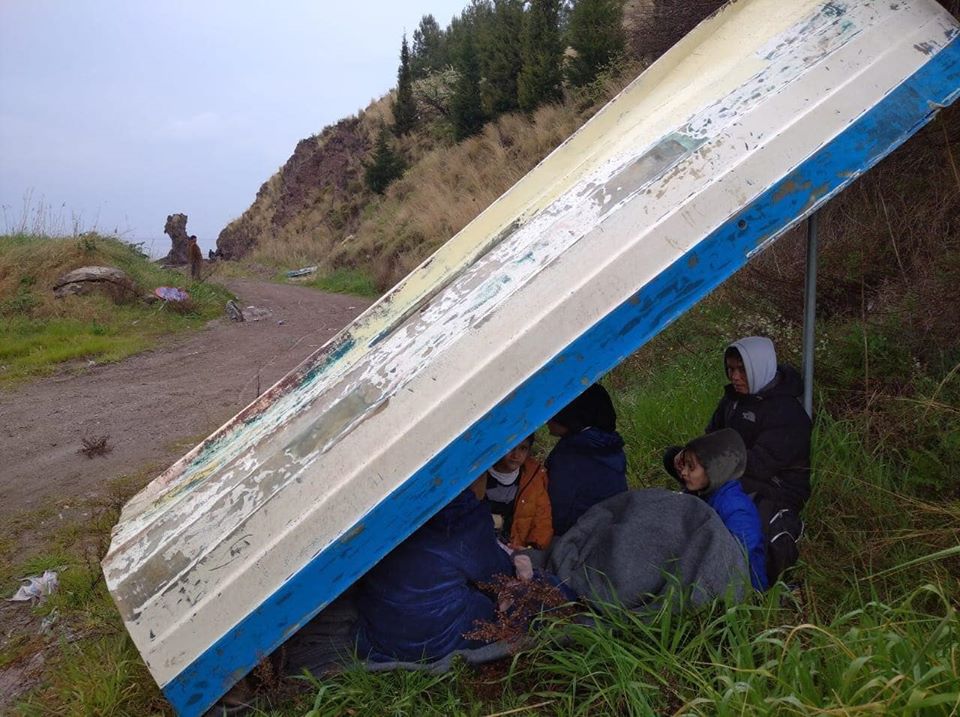
Sunday, April 5, 2020, by Iasonas Apostolopoulos
translated by Artemis Leontis
What is happening on Lesbos now is unbelievable.
All refugees arriving now on the shores of the island are left homeless in the middle of nowhere, wherever each of them happen to disembark. On account of the coronavirus, the state imposes a 14-day quarantine to the new arrivals, wherever they happen to land, and it forces them to stay outside, without offering shelter or any other support for their stay. They are abandoned by everyone and at the mercy of the weather.
Babies sleep with their mothers on the beach in the rain and gold.
In the midst of the stay-at-home order and a climate of fear, the few people who are still working in NGOs are trying to give the refugees sleeping bags and tents.
In the village of Petra, racist residents refused them the right to set up tents (“you’re not going to set up a camp here,” they said) and for 4 days, 54 people were sleeping in the mud in the ruins of the used old boats of refugees. (photo).
On April 1, another 39 people arrived on a deserted beach and walked 5 kilometers up the mountain looking for help. They stopped briefly in the village of Cleio. The next day it was raining, and those people were still sleeping in the dirt.
Since March 23, 127 refugees have arrived, and they are sleeping outside on beaches, in the mountains, and in the valleys.
Why this situation? The Minister of Immigration Notis Mitarachis formally requested the mayors of the islands to set apart some space or hotels to host the refugees for a few days. The answer from the mayors was almost unanimously, “we won’t give up our hotels, we won’t give them anything, bring a boat from Athens and send them there.” The boat didn’t arrive, and so the people are sleeping on the ground.
In a region where hundreds of thousands of tourists encounter hospitality every year, in a region where there are thousands of empty rooms, both the government nor local officials refuse to house a few dozen miserable human beings.
Recall that all these years, there has been one reception facility for short-term housing of refugees: the UN High Commissioner for Refugees camp for refugees (stage 2) at Sykamia. On March 1, after days of protests and riots against the refugee camps, NGO workers, and journalists, the camp was burned by arson before the eyes of police and politicians.
Indeed, a few months earlier, Taxiarchis Verros, the mayor of West Lesvos, went to the trouble to close the camp. To this day, he refuses to reopen it, even though a few tents and other infrastructure remain and can house 100-150 people.
Fundamentally, he is rewarding those racist people who set fire to the camp and fomenting the xenophobic instincts of the islanders at a very critical moment.
He is a worthy successor of the previous mayor of the town of Mytilini, S. Galinou, who drove a bulldozer to the port to block the humanitarian aid for Moria in a fight for the “decongestion of the islands.”
And so the days pass, and the unfeeling bureaucrats in local government leave people roofless in the winter cold, with their babies clinging to their arms. They are even proud of their accomplishment, stating, “we will not be blackmailed, we will not open [a new] camp,” and pass the buck back to the national government, which passes it in turn.
Petty fighting, obscene politicization on the backs of poor, battle-scarred people who are suffering in the cold.
In reality, behind the scenes of this performance of a rooster-fight lies an agreement of uncivilized people: the single, joint approach by Greece and Europe and its absolute unanimity in handling the arrival of refugees: make their lives unlivable, make their living conditions on the islands as miserable as possible in order to deter future arrivals.